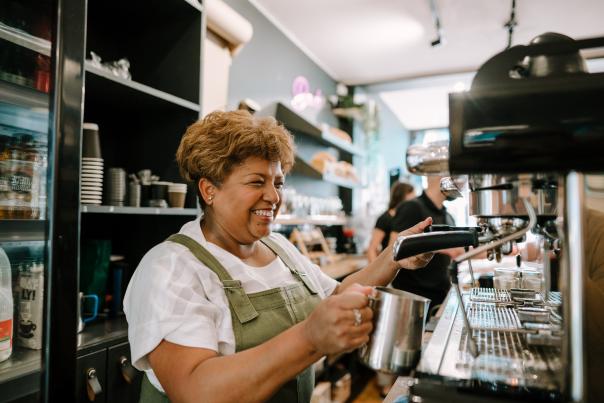
Staff shortages are nothing new for the catering and hospitality industry, they’ve been with us for years. What is different right now, though, is the sheer scale of an employment gap that is widening by the day.
A report from the environment, food and rural affairs (EFRA) Committee in April found that around one in eight food sector roles was unfilled, totalling around half a million workers. This included a critical shortage of chefs and waiting staff.
Responding to recent ONS employment figures which showed there were 173,000 vacancies recorded in the accommodation and foodservice sector between May and July, UKHospitality chief executive Kate Nicholls said: “Staff shortages have been at a record high in the hospitality industry for some time, causing thousands of operators to cut trading hours or close for whole days, at a cost of £21bn in lost revenue.”
A combination of Covid and Brexit have contributed towards the shortfall, but sector employers face deeper, structural challenges in attracting and retaining talent.
In her evidence to the EFRA committee, Nicholls highlighted the need for a long-term labour strategy for hospitality. “We need to understand [….] what we are looking for in terms of skills, training, development, jobs, the economy, how we get from here to there and what short, medium and long-term interventions we need to help support that.”
Recently the Public Sector Catering Alliance (formerly the PSC100 Group) asked the national catering organisations to poll members to better understand the major challenges they currently face.
Some 77% said they were still facing applicant shortfalls for vacancies, partly as a result of their inability to compete with higher private sector wages, while 74% said that applicants too often lacked the skills needed. Among other recruitment issues, 31% reported facing long delays to get DBS (Disclosure and Barring Service) clearance.
And a survey by LACA in the summer, which drew data from 168 respondents, found 78% said they were experiencing a lack of applicants for vacant positions post-Covid and 63% reported a lack of the required skills among the applicants they interviewed. Nearly a third (31%) specifically cited delays on DBS checks for suitable candidates, while just 11% said they had no recruitment issues.
Nearly 70% of respondents said that chef and kitchen assistant roles proved the most difficult to fill. Asked if the recruitment situation had got worse or not this year, 50% said no change, 44.6% said it had got worse and 5.4% reported an improvement.
Signature Prime – a case study
Signature, which offers luxury residential, nursing and dementia care in a range of locations across London and the home counties, has recently introduced a new recruitment campaign called Signature Prime.
Founder and owner director Paul Robottom says: “It is aimed specifically at the seniors market to encourage those in the twilight of their careers or those in early retirement to actively seek employment with us, including our Seniors Apprentice Scheme.
“My aim was always to build a team that is fully inclusive. I recognise that older colleagues in the prime of their life are statistically more likely to stay in their role for longer, and that they bring a wealth of life and work experience and passion, both qualities that are essential in the field that we operate in. For me personally a genuine passion for their role, and the work that we do is just as important as formal qualifications.”
He said the reasons behind the development of Signature Prime were:
- We are building an age-inclusive, multi-generational workforce
- We recognise that the current recruitment environment is not as age inclusive as it could be
- We understand the valuable life skills and experience that mature staff can bring to our team
- Due to both the Covid pandemic and the cost-of-living crisis, we recognise that people are working into their prime of life years, and want to take a proactive approach to building a multi-generational team
- Older workers are good for business, they change their job less frequently and can support younger workers by skill sharing
- Being age-inclusive helps supports staff who want to stay in work for longer
“As a specialist care caterer Signature Dining have always understood the value of effective recruitment and we have built an inclusive and diverse team of passionate individuals who love what they do. With the entire hospitality industry still recovering from Covid and heavily impacted by the current economic climate, recruitment of staff has been more challenging than ever.
“Signature Prime encourages mature workers to apply, irrespective of their experience in the industry, offering a wealth of training opportunities, including senior apprenticeships, to set people on the path to a lasting career in hospitality.
"With other benefits on offer, including flexible working patterns, staff wellness initiative and personalised training programmes, the campaign presents a great opportunity to mature job seekers and those wishing to continue employment in the prime of their lives.”